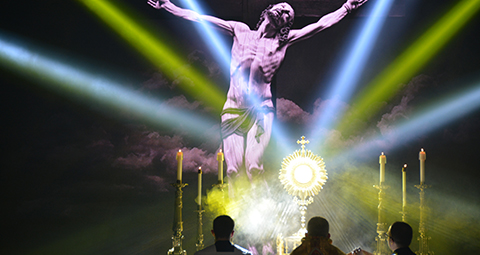February 22 | ![]() 0 COMMENTS
0 COMMENTS ![]() print
print

The key to priestly, celibate living is found in the love of Christ
While there are practical arguments for living a celibate life, ultimately the key reason is found in Jesus, writes Fr Jamie McMorrin
St Valentine’s day is not a big fixture in the social calendars of most priests.
Last Thursday, while the candle-lit tables of Edinburgh’s restaurants filled up with couples, the shop windows fitted out with displays of varying good taste and the local florists enjoyed a roaring trade in red roses, I had a few different engagements.
I met with a young couple preparing to get married, had a quick coffee with a friend from seminary, attended a meeting of the Society of St Vincent de Paul (someone did, at least, bring chocolates) and then spent the rest of the evening baby-sitting my young nephew while my sister and her husband went out for a romantic meal.
It was a really lovely evening and, somehow, a good way to honour the man, so often forgotten, after whom the festivities are named.
St Valentine himself, after all, was not only a saint and a martyr but he was also, like me, a celibate, Catholic priest. He lived in Rome in the third century and his renown as the celebrant of Christian weddings and preacher of the Good News of authentic, married love brought him to the attention of the Emperor, who, after torturing him, had him put to death on February 14, 269AD.
St Valentine’s witness shows the priesthood as a complement and a support to Christian marriage. His eventual martyrdom for the sake of the Gospel is a fulfilment of the Christ-like gift of his life and his love, of which celibacy is an eloquent symbol.
There are lots of reasons given to support the very ancient tradition of a celibate priesthood in the western Church. Some of these reasons are, to be honest, better than others.
For one thing, a single, celibate priest is cheaper and easier to move around at short notice than a married man with children. A celibate priest, without family commitments, might have more time available to care for others, at all hours of the day and night.
For one thing, the fact that I didn’t have a romantic date, meant that I was free for babysitting duty!
But these practical, utilitarian arguments can be debated; in any case, by themselves, they don’t convince, don’t satisfy and don’t inspire.
For me, the key to priestly, celibate living will always be found in the love of Jesus Christ. The priest is called to be conformed to Jesus in a particular way: he’s called to be an icon of Jesus’ love for the world and, in a special way, of his love for the Church.
Jesus—historically unfounded conspiracy theories aside—was a celibate man who loved passionately, perfectly and all-inclusively. He did not have a wife, in the ordinary sense—but He did have a bride.
He repeatedly refers to Himself as the bridegroom and compares the Kingdom of God to a wedding feast.
The bride, whom he loves with all the love of his sacred, human heart is the Church, the People of God. When Jesus goes to the Cross, he goes to lay down His life for His beloved bride: greater love has no man than this!
The call of priestly celibacy is, above all else, therefore, a call to love: to give and receive love.
The priest is called to love God ‘with an undivided heart,’ as the Rite of Ordination puts it, and to love the Church in imitation of Christ.
St John Vianney, the patron saint of parish priests, summed up the priesthood as the ‘love of the heart of Jesus.’
On the day of my first Mass, the preacher spoke about that love and said: “Fr Jamie, you are called to burn with the love of his heart for the salvation of souls.
“Be on fire with that celibate love! Because now is not the time for less love of the heart of Jesus.
“Now is the time for more love of the heart of Jesus. So, be that love among us for the sake of the Church! Wherever you are sent, always remember that lofty calling and be proud of it, for in it you will find great joy—a joy the world cannot give.”
Celibacy, like Christian marriage, is not easy. It involves sacrifice. I’ve not been a priest for very long, but already I’ve experienced, in all sorts of ways, celibacy as the source of the joy that the preacher spoke about that day: the joy of loving and being loved by the Church.
St Valentine lived out that love in his celibacy, in his preaching, in his priestly ministry but also in the ultimate laying down of his life, in perfect imitation of Christ.
In so doing, he pointed beyond this life to a love which awaits us in the great wedding feast of Heaven: the perfect love of the God who made us for Himself alone, and in whom all of our earthly loves will find their perfect fulfilment.










